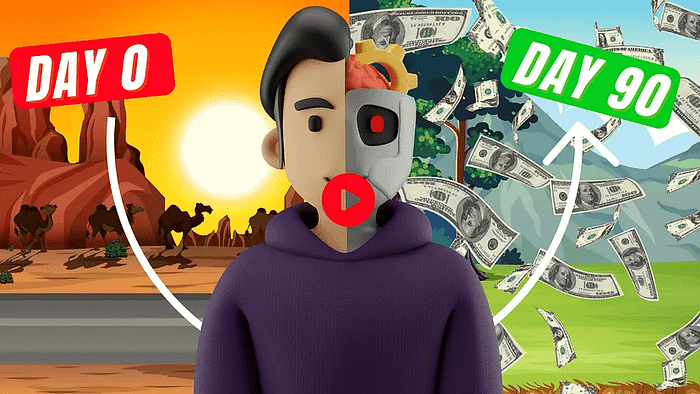This Common Pitfall Drains 95% of AI Automation Agency Resources
The Hidden Roadblock to AI Agency Success
AI automation agencies face a formidable challenge that’s derailing their path to profitability.
This unseen obstacle is preventing countless ambitious entrepreneurs from realizing their dreams of building thriving AI-powered businesses.
As someone who’s navigated these treacherous waters, I’ve uncovered the root cause of why so many AI automation agencies struggle to gain traction and generate sustainable revenue.
Let’s dive into the heart of this issue and explore how to overcome it, transforming your AI automation agency from a struggling startup into a powerhouse of innovation and profit.
We strongly recommend that you check out our guide on how to take advantage of AI in today’s passive income economy.
Table of Contents
The Three-Headed Monster Plaguing New AI Agencies
When you’re just starting your AI automation agency, you’re likely grappling with a trio of seemingly insurmountable problems:
- The Outreach Quagmire: With a dizzying array of outreach methods and software platforms at your disposal, pinpointing the right approach to connect with potential clients feels like searching for a needle in a digital haystack.
- The Client Conversion Conundrum: You finally land a call with a promising prospect, only to watch their eyes glaze over as you extol the virtues of chatbots and automation. The conversation ends with a polite “thanks, but no thanks,” leaving you back at square one.
- The Delivery Dilemma: Perhaps you’ve managed to snag your first client, whether it’s a freebie for a friend or a small monthly retainer. Now you’re burning the midnight oil, frantically trying to deliver a valuable product while learning on the fly.
These challenges are not unique to you. In fact, they’re the norm for about 95% of AI automation agencies. But why is this the case? What’s the missing piece that separates the struggling majority from the successful few?
The Critical Step Most AI Automation Agencies Overlook
Unveiling the Secret to AI Agency Success
The key element that most AI automation agencies miss is deceptively simple, yet profoundly important. It’s a step that can transform your business from a struggle to a success story.
This crucial step is conducting a thorough AI evaluation for each potential client.
Now, you might be thinking, “An evaluation? That’s it?” But don’t underestimate the power of this approach. It’s the difference between shooting in the dark and hitting the bullseye every time.
Why Traditional Agency Models Fall Short
Traditional agency models like social media marketing (SMM) or short-form content creation have a simpler path to success. Their offerings are straightforward and easily understood by clients.
AI automation agencies, however, operate in a more complex landscape. The possibilities are vast, but so are the potential pitfalls. This complexity is both a challenge and an opportunity.
The AI Automation Agency Advantage
Tapping into an Endless Market with Weak Competition
The AI automation agency model has a unique advantage: an almost limitless market with relatively weak competition. But to capitalize on this, you need to master one critical skill: understanding your client’s business inside and out.
Most business owners don’t realize they have inefficiencies in their operations. Trying to sell them solutions to problems they don’t know they have is a recipe for rejection.
This is especially challenging if you’re new to business yourself. How can you advise others on improving their operations when you’re still learning the ropes?
The AI Knowledge Gap
Everyone’s heard of AI, but few business owners truly understand how it can benefit their specific situation. Unlike Facebook ads, which have countless success stories, the AI market is still in its infancy.
This knowledge gap creates a significant hurdle: educating potential clients about the possibilities of AI in their business. It’s a crucial step that many AI automation agencies overlook.
The Power of Understanding: From Outreach to Delivery
Why Generic Solutions Fall Flat
Every aspect of your AI automation agency, from initial outreach to final delivery, hinges on a deep understanding of your clients’ pain points and challenges.
Without this insight, you’re likely to offer generic AI solutions that miss the mark. You might be building impressive tools, but if they don’t address the core problems your client faces, you’re just applying a high-tech Band-Aid to a deeper issue.
The Lipstick on a Pig Syndrome
There’s an old saying: “You can put lipstick on a pig, but it’s still a pig.” In the business world, this translates to a crucial insight for AI automation agencies.
No matter how sophisticated your AI chatbots or Zapier automations are, if the fundamental structure of your client’s business is messy and inefficient, your solutions won’t provide lasting value.
This approach leads to a vicious cycle: losing retainers, constantly hunting for new clients, and never achieving the stability and growth you desire for your AI automation agency.
The Solution: Implementing AI Evaluations
Transforming Your Approach with AI Evaluations
To break this cycle and set your AI automation agency on the path to success, you need to implement a robust AI evaluation process.
An AI evaluation is a comprehensive analysis of a potential client’s business, focusing on how AI could be integrated to solve real problems and drive tangible results.
The Evaluation Process: A Deep Dive into Client Needs
Here’s how an effective AI evaluation process works:
- Initial Discovery Call: Instead of trying to close the deal immediately, use this call to probe and understand the client’s business. Ask questions about their current processes, pain points, and goals.
- Detailed Questionnaire: After the call, send the client a comprehensive questionnaire. This should cover everything from their sales processes to their customer service approach.
- Analysis and Strategy Formulation: Once you receive the responses, analyze them thoroughly. Formulate a strategy for how AI could be integrated into their business to solve problems and improve efficiency.
- Customized Solution Presentation: Present your findings to the client, outlining specific AI use cases tailored to their business. Include cost estimates, timelines, and a hierarchy of recommendations.
The Power of Data-Driven Proposals
By following this process, you transform your sales approach. Instead of generic pitches, you’re presenting data-driven proposals that clients find hard to refuse.
This method not only increases your chances of landing clients but also sets the stage for long-term partnerships. You position yourself as an AI consultant, not just a service provider.
Scaling Your AI Automation Agency
From Novice to AI Automation Agency Legend
As you gain experience with AI evaluations, you’ll develop a deeper understanding of various business systems and processes. This knowledge allows you to tackle more complex projects and command higher fees.
However, it’s crucial to recognize your limits. Don’t be afraid to turn down projects that are beyond your current capabilities. It’s better to excel at simpler tasks than to struggle with overly complex ones.
The Path to Mastery
To become a true master in the AI automation agency field:
- Focus on understanding core business systems like lead generation, management, and sales processes.
- Develop critical thinking skills to identify efficiency gaps and potential AI solutions.
- Gain experience by speaking with diverse business owners and exploring various AI and non-AI solutions.
Conclusion: Your Roadmap to AI Automation Agency Success
The key to building a successful AI automation agency lies in your ability to truly understand and address your clients’ needs. By implementing a thorough AI evaluation process, you set yourself apart from 95% of your competitors.
Remember, the goal isn’t to sell a one-size-fits-all AI solution. It’s about becoming a trusted partner who can guide businesses through the complex world of AI integration.
As you master this approach, you’ll find your AI automation agency transforming from a struggling startup into a thriving consultancy, capable of delivering real value and generating substantial revenue.
The journey may be challenging, but with this strategic approach, you’re well-equipped to overcome the obstacles that stop most AI automation agencies from making money. Your path to becoming an AI automation agency legend starts now.
Frequently Asked Questions (FAQ)
What is an AI automation agency?
An AI automation agency is a specialized service provider that leverages artificial intelligence technologies to create automated solutions for businesses. These agencies focus on implementing AI-driven tools and systems to streamline operations, enhance efficiency, and boost productivity for their clients.
AI automation agencies typically offer a range of services, including:
- Custom chatbot development
- Workflow automation
- Data analysis and predictive modeling
- AI-powered customer service solutions
- Process optimization using machine learning algorithms
The primary goal of an AI automation agency is to help businesses harness the power of AI to solve complex problems, reduce manual labor, and achieve better results in various aspects of their operations.
How to start an AI automation agency step by step?
Starting an AI automation agency requires careful planning and execution. Here’s a step-by-step guide to help you get started:
- Develop your AI expertise:
- Gain a solid understanding of AI technologies, machine learning, and automation tools
- Stay updated with the latest trends and advancements in the field
- Define your niche:
- Identify specific industries or business functions where you want to focus your AI automation services
- Research the unique challenges and opportunities in your chosen niche
- Create a business plan:
- Outline your agency’s goals, target market, and service offerings
- Develop a financial forecast and pricing strategy
- Build a portfolio:
- Create sample projects or case studies demonstrating your AI automation capabilities
- Consider offering pro bono work to gain experience and testimonials
- Establish your online presence:
- Design a professional website showcasing your services and expertise
- Develop a strong social media presence to attract potential clients
- Network and form partnerships:
- Attend industry events and conferences to connect with potential clients and partners
- Collaborate with other agencies or freelancers to expand your service offerings
- Develop a sales and marketing strategy:
- Create compelling content to educate potential clients about AI automation benefits
- Implement targeted outreach campaigns to attract your ideal customers
- Invest in the right tools and infrastructure:
- Select appropriate AI development platforms and automation tools
- Ensure you have the necessary hardware and software to deliver high-quality services
- Build a team:
- Hire skilled AI developers, data scientists, and project managers as your agency grows
- Foster a culture of continuous learning and innovation
- Implement a client onboarding and delivery process:
- Develop a systematic approach to assess client needs and deliver customized AI solutions
- Create a framework for ongoing support and maintenance of implemented AI systems
How much do automation agencies charge?
The pricing structure for AI automation agencies can vary widely depending on several factors:
- Project complexity:
- Simple chatbot development: $5,000 – $15,000
- Comprehensive AI-driven workflow automation: $20,000 – $100,000+
- Agency expertise and reputation:
- Established agencies with a strong track record may charge premium rates
- Newer agencies might offer more competitive pricing to build their portfolio
- Pricing models:
- Project-based: One-time fee for specific deliverables
- Retainer: Monthly fee for ongoing services and support
- Performance-based: Pricing tied to measurable outcomes or ROI
- Client size and industry:
- Enterprise clients may be charged higher rates due to more complex requirements
- Some industries (e.g., finance, healthcare) may command higher prices due to specialized knowledge needed
- Customization level:
- Off-the-shelf solutions with minimal customization: Lower cost
- Fully customized, bespoke AI solutions: Higher cost
- Ongoing support and maintenance:
- Basic support: Included in the initial price or a small monthly fee
- Comprehensive managed services: Higher monthly retainers
Typical pricing ranges:
- Small projects or basic automations: $5,000 – $25,000
- Medium-sized projects: $25,000 – $75,000
- Large-scale, enterprise-level automations: $75,000 – $250,000+
Monthly retainers for ongoing services and support can range from $2,000 to $20,000+, depending on the scope of work and level of support provided.
What is the AI agency business model?
The AI agency business model typically revolves around providing specialized AI-driven solutions to businesses. Here are the key components of this model:
- Service offerings:
- Custom AI solution development
- AI integration and implementation
- AI strategy consulting
- Ongoing support and maintenance
- Revenue streams:
- Project-based fees
- Monthly retainers
- Licensing fees for proprietary AI tools
- Performance-based pricing models
- Client acquisition:
- Inbound marketing (content marketing, SEO)
- Outbound sales (targeted outreach, cold calling)
- Referrals and partnerships
- Thought leadership and industry events
- Value proposition:
- Expertise in cutting-edge AI technologies
- Customized solutions tailored to client needs
- Measurable ROI and business impact
- Ongoing support and optimization
- Operational structure:
- Core team of AI experts and developers
- Project managers and client success teams
- Partnerships with specialized service providers or freelancers
- Scalability:
- Developing proprietary AI tools and frameworks
- Creating repeatable processes for solution delivery
- Building a knowledge base for efficient problem-solving
- Continuous innovation:
- Investing in R&D to stay ahead of AI trends
- Experimenting with new AI technologies and applications
- Collaborating with academic institutions or research organizations
- Client retention:
- Providing ongoing value through AI system optimization
- Offering training and support to maximize client adoption
- Regular check-ins and performance reviews
The AI agency business model focuses on delivering high-value, specialized services that leverage artificial intelligence to solve complex business problems. Success in this model relies on staying at the forefront of AI technology, building strong client relationships, and continuously demonstrating the tangible benefits of AI automation to businesses across various industries.

We strongly recommend that you check out our guide on how to take advantage of AI in today’s passive income economy.




